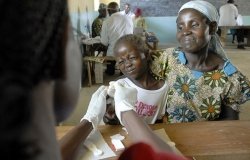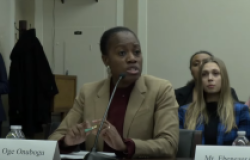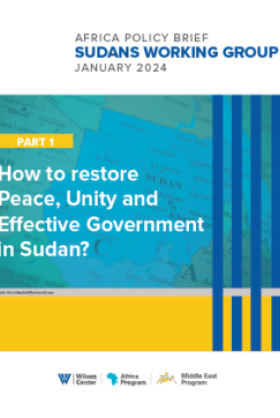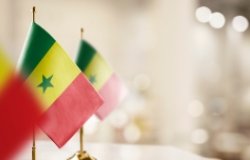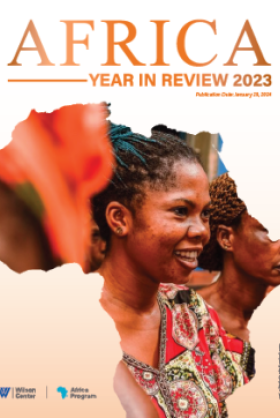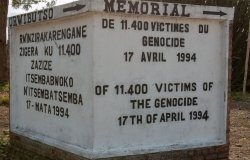The Future of Democracy in South Africa and the Region
With Paul Graham, Executive Director of the Instittue for Democracy in South Africa (IDASA),and Judith February, leader of the political information and monitoring service at IDASA. Moderator: Ambassador Princeton Lyman, Adjunct Senior Fellow at the Council of Foreign Relations and Adjunct Professor at Georgetown University.
Overview
On January 31,, 2008 the Africa Program hosted a discussion of recent events in South African politics and their implications for the future of democracy in the country and the region. The speakers were Paul Graham, executive director of the Institute for a Democratic Alternative in South Africa (IDASA) and Judith February, leader of the political information and monitoring services also at IDASA. Princeton Lyman, Adjunct Senior Fellow at the Council on Foreign Relations and Adjunct Professor at Georgetown University, served as moderator.
Paul Graham began by discussing South Africa's recent appearance on the cover of the New York Times because of an electricity crisis. Graham explained that the crisis is part of a wider picture of ongoing dilemmas the country is facing due in part to the current government's attempts to give South Africa a competitive edge on the global market. Up until a few months ago, South Africa was the number one producer of Gold in the world, making the mining industry an essential sector for the economy. But, as a result of the electricity crisis, gold mines were shut down causing a rise in the world price of gold.
He added that the crisis results from a failure to expand the energy industry about ten years ago. At the time the energy sector was identified as one where the private sector could make a contribution. This development was part of a wider scheme to boost the economy by increasing private sector involvement and introducing deregulation. According to Graham, "the price of electricity was so low and the global opportunities so great that the private sector did not take up the opportunity in South Africa." Consequently, new power stations were not built and at the same time a couple of large power stations were mothballed under the assumption that there was sufficient energy. A large number of engineers were released which exacerbated the human resource shortages in the energy sector. All of this was made worse by the rapidly growing South African economy and consumer demands.
Graham outlined some of the other challenges which lay ahead for South African policy makers. These included trying to maintain the economic growth and transform both the public and the private sector so as to include previously disadvantaged people despite constraints on education and health. Immigration also poses a problem as migration into South Africa remains substantial. This increasingly puts a strain on South African politics and the economy. When describing political sentiment in the country, Graham said that "many people have felt shut out and left out of the democracy dividend. The government. has shut out this generation in order to compete globally and to prepare a better future for the next generation." As a result in the last couple of years there have been various protests around the country. These divisions are personified in the conflict between President Thabo Mbeki and Jacob Zuma, former Deputy President and now President of the governing party.
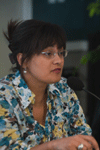 Judith February focused on the 52nd National Conference of the African National Congress (ANC) which was held last year at Polokwane. During the conference the conflict between President Thabo Mbeki and Jacob Zuma culminated with the latter emerging as the new president of the ANC. This reflects the party members' desire for change. She also described the importance of the South African constitution as a tool which could be used by South Africans to exercise their democratic rights.
Judith February focused on the 52nd National Conference of the African National Congress (ANC) which was held last year at Polokwane. During the conference the conflict between President Thabo Mbeki and Jacob Zuma culminated with the latter emerging as the new president of the ANC. This reflects the party members' desire for change. She also described the importance of the South African constitution as a tool which could be used by South Africans to exercise their democratic rights.
In this regard, February described the South African constitution, saying that it plays an important role in understanding what happened at Polokwane. There are two threads running through the constitution. One is the issue of representative democracy; the other is the issue of participatory democracy. For example citizens can make suggestions on pieces of legislation and were at the center of the constitutional process itself, when the public were asked to submit suggestions on the structure of the constitution. Additionally, socio economic rights have been enshrined into the constitution, to include the right to healthcare, housing, a clean environment and education. February added that these are basic rights, which in legal terms means people can actually sue to ensure they receive them. But, what is on paper is not quite the reality. The constitution provides a space for people to start thinking about countering the forces of power.
Currently, South Africa is redefining its political spaces. While this might be threatening, it is also the result of a real democratic process by citizens at large and members of the ANC in response to what February referred to as "a shutting down of the political space during the Mbeki years." During those years, parliament molded public participation into a formalistic process which left people outside the circle of power. At Polokwane, there was a desire by people within the ANC and its alliance members to have their voices heard. With Mbeki firing Zuma over allegations of corruption, a schism was created within the party especially as people began to push Zuma's candidacy for the presidency of the ANC. February added that what was most interesting about the Polokwane conference was that individual people were taking back the party.
She concluded her presentation by saying that South Africa was "very good at setting up the trappings of democracy" but the challenge for the future remains figuring out how to insulate institutions from political pressure and who to populate these institutions with in order to strengthen them.
One audience member asked how the potential of Zuma being convicted of corruption could affect South Africa's stability. February replied that the ANC had already begun considering what to do in the event of Zuma's conviction by looking at other potential candidates for leadership. They were also confident that other leaders of the ANC would be able to talk Zuma's supporters into accepting such a verdict. It is also important to note that the supporters of Zuma are not a homogenous group, there are people supporting him because he is not Mbeki, or others who just feel that it is time for change.
Other questions related to South Africa's lack of true political opposition to the ANC alliance and if recent events within the alliance lead to an eventual break up of the ANC, how would it affect the future of democracy in the country? February responded by saying that South Africans have always lived with a certain degree of uncertainty during and post apartheid. She did not believe that the ANC would break up in the near future since it had a good foundation. For example, the alliance system is set up in such a way that it allows for its members to be heard in a way that would not occur if they were outside the ANC. As to the future of democracy, it is now up to the leaders and citizens to make the right choices.
To the same questions Graham added that opposition parties have not and will not manage to extend their electoral support into the African community. Furthermore, in the next elections, the ANC will campaign like an opposition party since most of the heat will be directed at the outgoing ANC administration. It has been demonstrated that the ANC is significantly different in different parts of the country so its internal deliberations are very democratic and representative of diverse opinions.
The discussion ended with a question about how countries in the region could deal with imperial presidents which is an issue for all of Africa. Graham responded that the problem resides in the fact that over time presidencies accrue power and knowledge. After a while they give their citizens a sense of security and come to believe that they are the best for their societies. This is why term limits are so important as they force presidents to consider succession and get citizens into the habit of accepting change.
Drafted by Medesse R. Sonou, Intern and Mame Khady Diouf, Program Assistant, Africa Program.
Documents & Downloads
Hosted By

Africa Program
The Africa Program works to address the most critical issues facing Africa and US-Africa relations, build mutually beneficial US-Africa relations, and enhance knowledge and understanding about Africa in the United States. The Program achieves its mission through in-depth research and analyses, public discussion, working groups, and briefings that bring together policymakers, practitioners, and subject matter experts to analyze and offer practical options for tackling key challenges in Africa and in US-Africa relations. Read more
Thank you for your interest in this event. Please send any feedback or questions to our Events staff.




